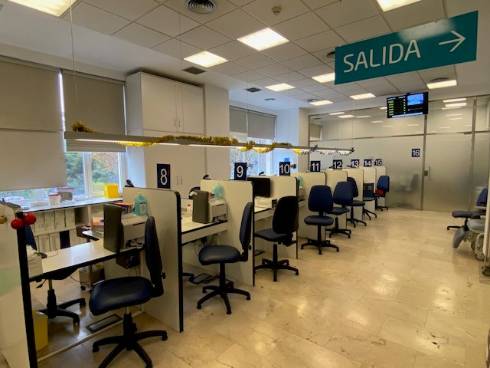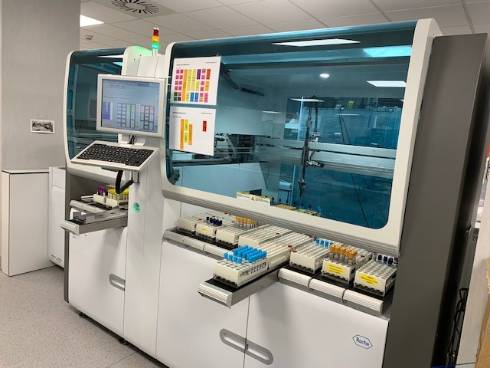Microbiology
Facilities:
-
Blood draw room: Blood drawing, common area for all laboratories. Located on the mezzanine floor.

-
Microbiology Laboratory: Located in the basement of building 6. Includes the sections:
- Preanalytics (on the ground floor): Receipt, centrifugation, handling, preparation, preservation and storage of samples. Common area for all laboratories.

- Conventional bacteriology.
- Biological Safety Laboratory (P3).
- Mycology Laboratory.
- Parasitology laboratory.
- Identification by mass spectrophotometry (MALDI-TOF).
- Serology and Molecular Biology Laboratory.
- Quality of care section.
The laboratory operates 24 hours a day, 365 days a year.
Techniques and procedures:
The FJD's Microbiology Department is equipped with the latest technology for diagnostic procedures for infectious diseases. It receives samples from the dependent primary healthcare areas, and is a referral centre for other hospitals in Quirónsalud group. Particularly noticeable in this regard is the high level of automation and integration with the computer systems in the different hospitals, ensuring a seamless transfer of information. Main characteristics:
1. Receipt of samples:
We use the HERMES system for exhaustive control over the transportation containers received from various hospitals, enabling us to track the origin of each container and the temperature of the samples during transportation through the sensors fitted inside.
2. General Bacteriology:
We also perform manual and automatic seeding of samples. Microbial identification is performed by MALDI-TOF mass spectrophotometry, along with sensitivity studies by automated MIC. Quantitative studies are also performed after sonication of the extracted prosthetic materials.
3. Biological Safety Laboratory:
A biosafety laboratory (P3) is available for diagnosis of Level 3 pathogens, the most frequent in our setting being tuberculosis. It counts on molecular identification techniques, and also performs sensitivity studies of mycobacteria and aerobic actinomycetes using cutting-edge methods.
4. Molecular biology laboratory:
- Syndromic molecular diagnosis is available for infectious diseases of the Central Nervous System, Prosthetic Infection, Respiratory and Digestive Diseases, allowing a highly sensitive, specific aetiological diagnosis in under two hours.
- PCR Nuclear Magnetic Resonance for aetiological diagnosis of sepsis within 5 hours of sample collection.
- PCR (FluoroType®) for detection in direct sample or to identify mycobacteria and their markers of resistance to tuberculostatic drugs.
- Study of Helicobacter disease and detection of resistance markers by PCR.
Hospital Universitario Fundación Jiménez Díaz
Avda. Reyes Católicos, 2
28040 Madrid Madrid
© 2026 Quirónsalud - All rights reserved























